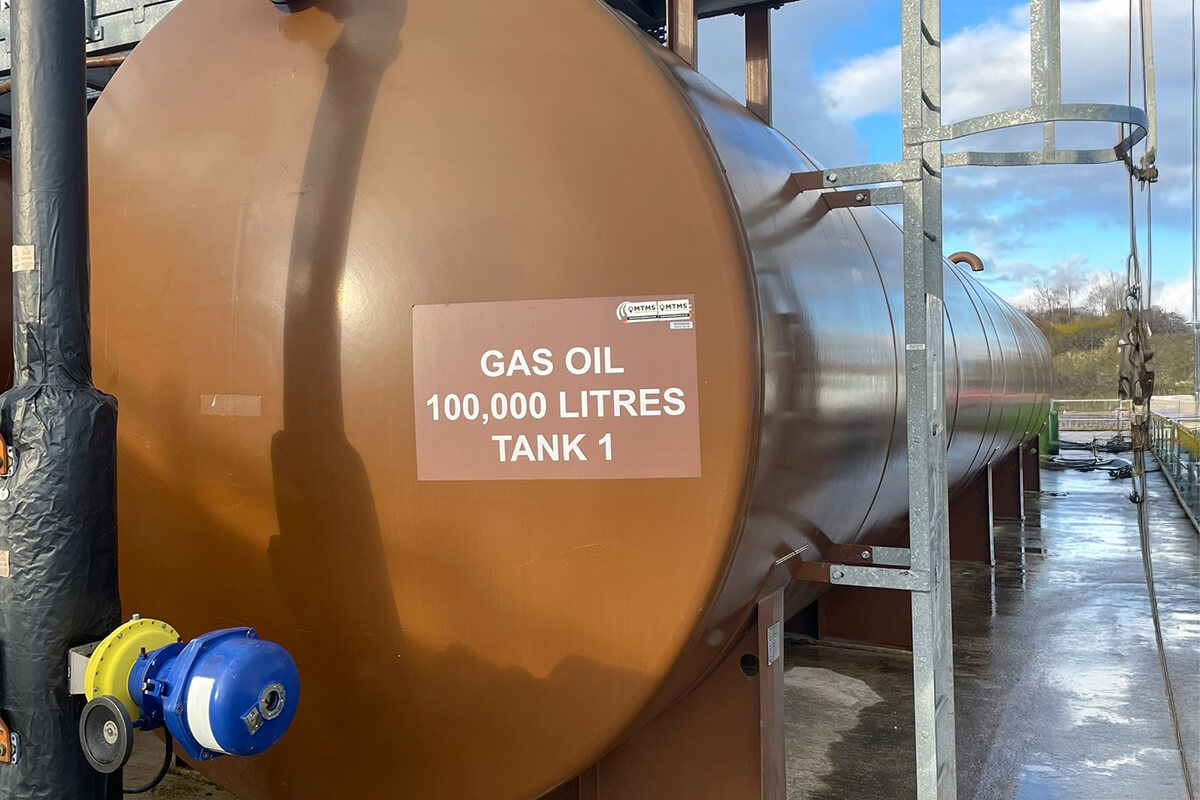Best practices for storing diesel fuel safely and compliantly on-site
Whether you’re powering plant equipment on a construction site, keeping a fleet running smoothly, or backing up critical infrastructure, storing diesel fuel on-site can provide essential flexibility and security. But improper storage can lead to costly contamination, safety hazards, environmental risks — and even legal penalties.
Here at RSM Fuel Services, we know that effective fuel storage isn’t just about tanks. It’s about smart planning, ongoing compliance, and a proactive approach to safety and maintenance. Below, we break down the best practices to ensure your on-site diesel storage is secure, sustainable, and set up for long-term performance.

1. Choose the right fuel storage tank for your needs.
Your storage system needs to be appropriate for the volume of fuel, type of usage and duration of storage.
- Above-ground vs below-ground: Above-ground tanks are easier to inspect and maintain, while below-ground options can free up space but require more intensive installation and monitoring.
- Bundled tanks: These are double-walled or include a secondary containment layer to prevent leaks and are recommended (or required) by UK regulations in many settings.
- Portable options: Ideal for temporary or mobile operations, such as remote worksites.
We supply and install a wide range of compliant fuel tanks, from static to mobile, with capacities to suit everything from small workshops to full-scale fleet depots.
2. Consider the location very carefully.
Where you place your tank can impact everything from safety to longevity.
- Avoid flood-prone areas or places with poor drainage.
- Keep clear of ignition sources, machinery, and high-traffic zones.
- Ensure easy access for fuel deliveries and inspections.
- Maintain a safe distance from buildings and watercourses as outlined in the Control of Pollution (Oil Storage) Regulations.
Our site surveys ensure every installation we carry out considers environmental impact, access and risk mitigation right from the start.
3. Prevent contamination and degradation.
Over time, diesel can degrade, and dirty fuel can mean engine failure, downtime and potentially expensive repairs.
- Use fuel stabilisers and anti-bug additives to prevent microbial growth (“diesel bug”) in your tank.
- Ensure your tank is fitted with filters and water separators to remove condensation and particles.
- Stick to a first-in, first-out policy to keep stock rotating and fresh.
- Avoid topping up dirty tanks – clean or flush tanks regularly.
We also offer fuel polishing services to restore contaminated fuel to usable condition and extend its lifespan.
4. Monitor fuel levels and usage.
Manual dipping may still be common, but it’s prone to error and delays. Digital monitoring systems offer real-time insight into your fuel stock, helping prevent theft, detect leaks early and keep your operation running without interruptions.
We install and integrate remote fuel monitoring systems for complete visibility, from fuel levels to consumption trends, so you can forecast refills and spot unusual usage before it becomes a problem.
5. Stay compliant with UK regulations.
The Control of Pollution (Oil Storage) (England) Regulations 2001, OFTEC regulations and the Environmental Protection Act are just some of the regulations governing diesel fuel storage in the UK. Key points to consider include:
- Secondary containment (bunding) must hold 110% of the tank’s capacity.
- Tanks must be clearly labelled and in good working order.
- You must have a spill response plan and appropriate materials on hand.
- Regular inspections and maintenance are essential and records must be kept.
At RSM, we take the complexity out of compliance. We carry out full risk assessments, provide compliant solutions and can schedule regular inspections to help you stay on the right side of regulations and industry best practice.
6. Invest in regular maintenance.
Your fuel system should be checked and serviced on a scheduled basis to prevent corrosion, check seals, test alarms and sensors and remove water or sediment build-up. Neglect can lead to tank failures, leaks or non-compliance.
Our maintenance packages provide total peace of mind with scheduled servicing, emergency support and expert advice, helping you avoid unplanned downtime or hefty repair costs.
7. Have a spill prevention & response plan.
Even with the best planning, accidents can happen. You’ll need:
- A spill response kit nearby at all times.
- Staff trained in emergency procedures.
- Clearly marked contact information for emergencies.
We supply and train customers on fuel spill kits and emergency procedures as part of our handover process.
In the event you don’t have a spill response plan yet and something does go wrong, RSM are on hand 24hrs a day on a dedicated response line. 0330 320 0744.
Get expert help with your diesel fuel storage.
Storing diesel on-site is a smart way to streamline operations, but only if it’s done right. From design and supply to compliance and long-term maintenance, we provide end-to-end support for secure, compliant, and cost-effective diesel fuel storage. So whether you need a single tank or a full fuel management system, we’re here to help. Find out more on our Fuel Services page.
Ready to improve your on-site diesel storage? Get in touch today to find out how RSM Group can support your operation from the ground up.